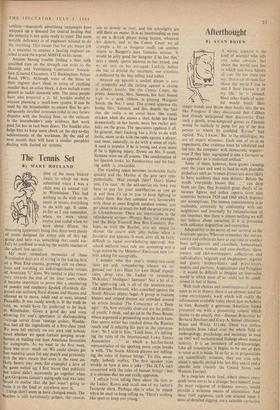The Tennis Set
By MARY HOLLAND
. My most immediate memories of those Wimbledon days are of sitting in the baking heat of a West End cinema, growing sick on choco- lates and watching an indistinguishable stream of American 'LP films. We tended to play truant only towards the end of the treat years, when it became important to prove that a smothering of powder and raspberry lipstick effectively dis- guised our uniform floral dresses and blazers and allowed us to move, adult and at ease, around Piccadilly. It was rarely worth it. If the truth be told, we would have far preferred to be back at Wimbledon. Given a good day and even allowing for one's ignorance in distinguishing 'vantage server from 'vantage striker, Wimble- don had all the ingredients of a first-class treat. We were left entirely on our own and nobody cared whether we spent forever gorging straw- berries or trailing our lean American favourites for autographs. As we went in the first week, there was never much on. We could always get free standing space fol. any match and proximity With the stars meant that even in the most un- likely hearts (my own, for example) a love of the game welled up. I first learnt that publicity and talent didn't necessarily go together when I got Gorgeous Gussie's autograph and was later forced to realise that she just wasn't going to !bake it to the final or anywhere near it.
Things don't seem to have changed much. The Weather is still fortuitously golden, the crowds
are as dowdy as ever, and the schoolgirls are still there en masse. It is as heartrending as ever to see a British player -being beaten, whatever his deserts, and at the Centre Court we all
crumple a bit as Sangster muffs yet another return to Bungert's lean Teutonic service. 'It would be jolly good for Sangster if he lost this,' says a sturdy sports mistress to her brood, and we all turn on her outraged. Luckily, before she has to defend the statement, our attention is deflected by the boy selling iced lollies.
Anyone up against a seeded player is sure of sympathy and the feeling against a champ is always hostile. On the Centre Court, the pretty American, Mrs. Susrnan, her hair bound high in a pink ribbon, is playing Margaret Smith, the No. I seed. The crowd approve the losing Mrs. Susman, and this despite the fact that she really is an awful ham. -She stands stricken when she misses a shot, holds her head dramatically in her hands, beats her racket piti- fully on the grass. The spectators applaud it all.
In general, their backing has a little to do with looks, more to do with the odds against a player, and most, naturally, to do with a sense of style.
A seed is popular if he is losing and even more if he is fighting injury. Down on No. 5 court, Santana wins on all counts. The combination of his Spanish looks, his flamboyance and his hurt- ing ankle is irresistible.
The standing space becomes intolerable fairly quickly and the Marine at the gate says sym- pathetically, 'Had enough then? Don't blame you, I'm sure.' At the self-service tea lawn you have to pay for your strawberries as you go in and then it's up to you to keep fighting to collect them. But they compare very favourably with those at most English outdoor events; you get about twice as much for half the price you pay at Glyndebourne. There are innovations in the refreshment service—Wimpy Bars, for example, and the Help Yourself Bon Bon Counters. Per- haps, as with the Beatles, you are meant to shower the courts with jelly babies when a
favourite star appears. It must, after all, be fairly difficult to signal overwhelming- approval. Any school uniform must rule out screaming and a large notice by the Members' Enclosure now for- bids asking for autographs.
I wonder who this year's twenty-two-carat idols are and, remembering whence we or- ganised our 'Let's Hunt for Lew Hoad' expedi- tions, drop into the Ladies to eavesdrop. McKinley? Mulligan? Santana? Not a bit of it. The approving talk is all of the nineteen-year- old Russian Metreveli, who scratched against the South African player Segal. A group in maroon blazers and striped dresses are crowded around an article headed The Conscience of a Teen- ager."Ah, how enviably clear-cut are the politics of youth,' I think, and go up to the Press Room, where argument is proceeding over the bath buns.
One sports writer has tracked down the Russian coach and is relaying his part in the conversa- tion: 'So I said to him, "Look here, it's infring- ing the rules of the International Lawn Tennis Association . ." ' at which a hatchet-faced representative of the sporting press corps breaks in with, `The South African players are infring- ing the rules of human beings.' To this, amaz- ingly, nobody replies. The first speaker tries weakly to turn it into a joke—The ILTA isn't concerned with the rules of human beings'—but it is obvious that no one really approves.
I refrain from telling, them about the fans in the Ladies' Room and recall one of my father's favourite dicta. Perhaps this is what he meant when he used to keep telling us, 'There's nothing like sport to keep you young.'






























 Previous page
Previous page